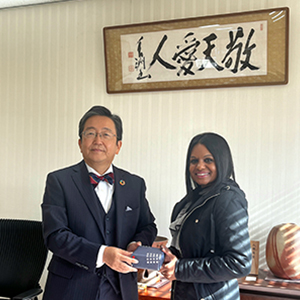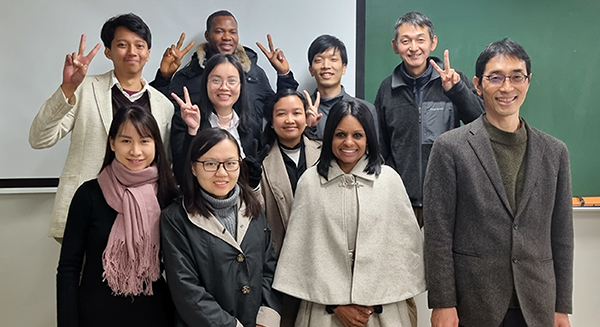Unisa Researcher Breaks Barriers in Environmental Research, Paving the Way for Progress
Selected to represent South Africa in the prestigious Young Female Scientist Programme, Dr Suvania Naidoo, Head of Teaching and Learning, Community Engagement and Student Support at Unisa’s College of Human Sciences, has emerged as a beacon of inspiration in the realm of environmental research.

Dr Suvania Naidoo with Dr Nasu Yasutomo, President, Okayama University
Launched in 2020 by the United Nations Conference on Trade and Development (UNCTAD) in collaboration with Okayama University in Japan, the programme aims to engage talented young women to build human capital in fields related to science, technology and innovation (STI) in developing countries through educational programmes to contribute to the achievement of the United Nations’ Sustainable Development Goals (SDGs).
The programme offered the opportunity for five young female scientists from Africa and Southeast Asia to engage in cutting-edge research activities at Okayama University. UNCTAD and Okayama University jointly searched for faculty members and teams that best matched the research interests of applicants. Naidoo’s inclusion signifies not only her individual achievement, but is also a significant leap forward for researchers breaking barriers in fields traditionally dominated by the natural sciences.
“Being part of the Young Female Scientist Programme was a tremendous honour,” says Naidoo. “My experience at Okayama University not only provided a platform for collaboration between the natural and social sciences that is essential to achieving the SDGs, but was also significant from a cultural perspective.”
Naidoo’s research niche, which focuses on water and environmental management with an emphasis on the mining industry’s impact on water quality, sets her apart as a trailblazer. During her time at Okayama University, from mid-November to mid-December 2023, she delved into cutting-edge research activities under the theme “Towards a Co-creation of Sustainable Human-Nature Hybrids: Asian and African Perspectives”.
Her work took her beyond the confines of the lab, with a notable visit to Teshima island in Japan, where she witnessed the restoration of a site marred by illegal toxic waste. Drawing parallels between Teshima’s journey and South Africa’s mining-induced environmental challenges, she identified key learnings and best practices that could revolutionise environmental rehabilitation in her home country.

Pictured here with the programme’s participants are Okayama University’s Prof Fumikazu Ubukata (front, right) and Prof Hiroaki Somura (back, right)
Naidoo’s unique position as a social scientist conducting research in a predominantly natural science-dominated field adds a layer of richness to her contributions.
Naidoo’s transformative journey serves as an inspiration for aspiring researchers, proving that, with determination and expertise, individuals can lead the way in reshaping the landscape of environmental research.
“The Young Female Scientist Programme has not just invested in one researcher; it has ignited a spark that promises to illuminate the path towards a more sustainable and inclusive future,” concludes Naidoo.

